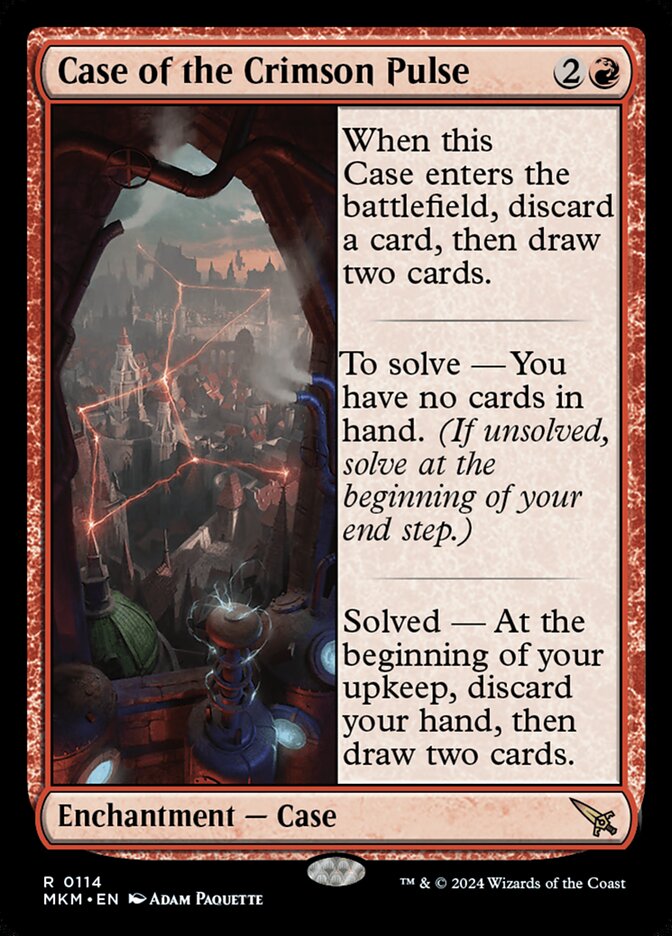
Case of the Crimson Pulse {2}{R}
Enchantment — Case
When this Case enters, discard a card, then draw two cards.
To solve — You have no cards in hand. (If unsolved, solve at the beginning of your end step.)
Solved — At the beginning of your upkeep, discard your hand, then draw two cards.
Illustrated by Adam Paquette
- Standard
- Legal
- Alchemy
- Legal
- Pioneer
- Legal
- Explorer
- Legal
- Modern
- Legal
- Historic
- Legal
- Legacy
- Legal
- Brawl
- Legal
- Vintage
- Legal
- Timeless
- Legal
- Commander
- Legal
- Pauper
- Not Legal
- Oathbreaker
- Legal
- Penny
- Not Legal
Toolbox
Buy This Card
Notes and Rules Information for Case of the Crimson Pulse:
- If you have no cards in hand as Case of the Crimson Pulse’s first ability resolves, you won’t discard a card, but you will still draw two cards. Similarly, if you have no cards in hand when Case of the Crimson Pulse’s last ability resolves, you won’t discard any cards, but you’ll still draw two cards. (2024-02-02)
- Each Case has two special keyword abilities: to solve and solved. (2024-02-02)
- “To Solve — [condition]” means “At the beginning of your end step, if [condition] and this Case is not solved, it becomes solved.” (2024-02-02)
- The meaning of “solved” differs based on what type of ability follows it. “Solved — [activated ability]” means “[Activated ability]. Activate only if this Case is solved.” Activated abilities contain a colon. They’re generally written “[Cost]: [Effect].” (2024-02-02)
- “Solved — [Triggered ability]” means “[Triggered ability]. This ability triggers only if this Case is solved.” Triggered abilities use the word “when,” “whenever,” or “at.” They’re often written as “[Trigger condition], [effect].” (2024-02-02)
- “Solved — [static ability]” means “As long as this Case is solved, [static ability].” Static abilities are written as statements, such as “Creatures you control get +1/+1” or “Instant and sorcery spells you cast cost {1} less to cast.” (2024-02-02)
- “To solve” abilities will check for their condition twice: once when the ability would trigger, and once when it resolves. If the condition isn’t true at the beginning of your end step, the ability won’t trigger at all. If the condition isn’t true when the ability resolves, the Case won’t become solved. (2024-02-02)
- Once a Case becomes solved, it stays solved until it leaves the battlefield. (2024-02-02)
- Cases don’t lose their other abilities when they become solved. (2024-02-02)
- Being solved is not part of a permanent’s copiable values. A permanent that becomes a copy of a solved Case is not solved. A solved Case that somehow becomes a copy of a different Case stays solved. (2024-02-02)